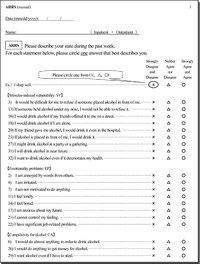ARRS:Alcohol Relapse Risk Scale
Introdution of the ARRS
 Alcohol Relapse Risk Scale (ARRS) is a self-rating scale developed by Tokyo Metropolitan Institute of Medical Science to predict the risk of alcohol reuse multilaterally in patients with alcohol dependence.
Alcohol Relapse Risk Scale (ARRS) is a self-rating scale developed by Tokyo Metropolitan Institute of Medical Science to predict the risk of alcohol reuse multilaterally in patients with alcohol dependence.
The ARRS has 32 items and measures the risk of alcohol reuse in 5 dimensions: stimulus-induced vulnerability, emotionality problems, compulsivity for alcohol, lack of negative expectancy for alcohol, and positive expectancy for alcohol. The ARRS includes 5 items to measure insight into mental condition. It takes about 15 minutes to complete the ARRS.
Although it is important to predict alcohol reuse, the risk of alcohol reuse was not indicated only as “craving for alcohol”. The ARRS is expected to estimate and predict the risk of stimulant reuse multilaterally.
Do you consider using the ARRS ?
- You are free to use the ARRS without permission from the developer (Tokyo Metropolitan Institute of Medical Science) in case of intended purpose for academic, clinical setting, and research.
- However, please refrain from commercial use.
- You can use the following link to download the file of the ARRS.
- Please cite the following reference in conference presentations or articles.The results of standardization of the SRRS are described in the following article.
- Ogai, Y., Yamashita, M., Endo, K., Haraguchi, A., Ishibashi, Y., Kurokawa, T., Muratake, T., Suga, R., Hori, T., Umeno, M., Asukai, N., Senoo, E., and Ikeda, K.
Application of the Relapse Risk Scale to alcohol-dependent individuals in Japan: Comparison with stimulant abusers.
Drug and Alcohol Dependence, 101:20-26.
Download  (2012/08/01) ENGLISH
(2012/08/01) ENGLISH
Interpretation of scores
- There are many factors that lead to relapse that vary from person to person, so this scale does not have a clear cutoff point (e.g., if the score is above this level, there is a risk of relapse).
- Basically, we would like you to evaluate the score in relation to the variation caused by continuous implementation or in relation to other variables.
- For reference, here are the mean scores (standard deviations) of the ARRS subscales and total scores according to the data used for standardization, with and without continuous drinking (not stopping drinking at the time of the first measurement) and with and without slips (drinking at the time of follow-up one month later). The scores are calculated as the mean scores in the range 1-3. Please use this as a reference when evaluating scores.
Contact / Collaborative study
Our research team is conducting additional research to enhance predictive capability of the ARRS with a review of each item. Please feel free to contact us (Research Project for Addictive Substances) if you are interested in collaborative studies with us or have any questions regarding the ARRS. .
